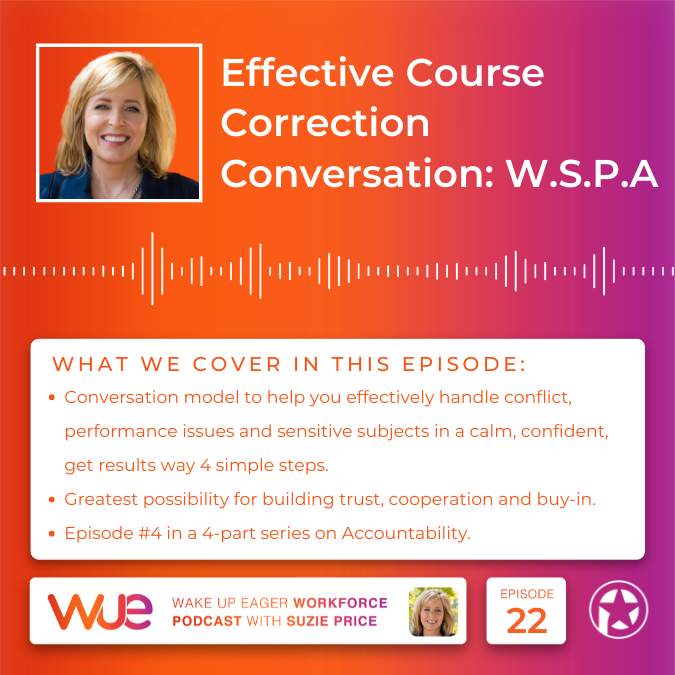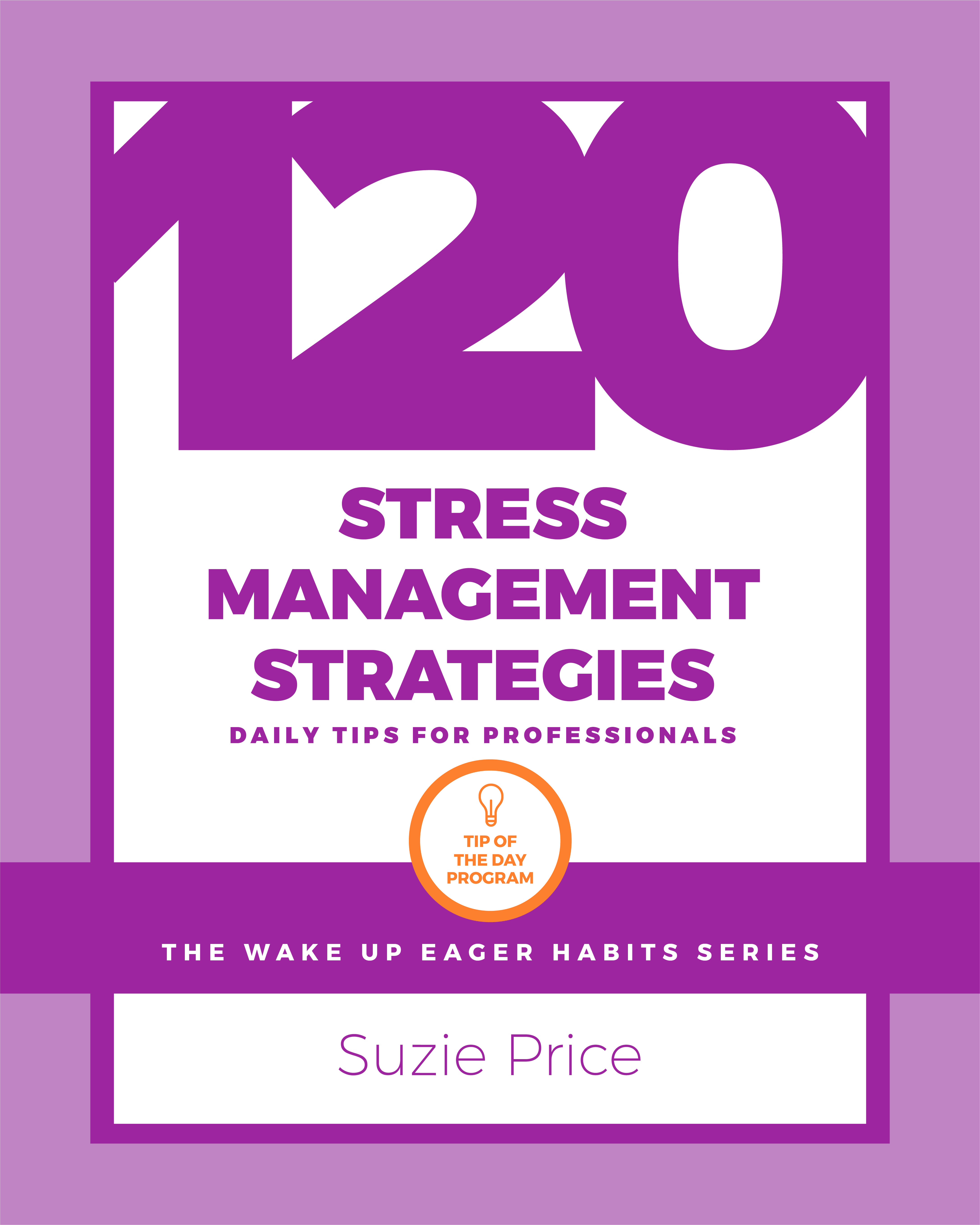The Know How You Need & the Tools to Get You There... Get Certified >

Podcast Episode #22: Effective Course Correction Conversation: W.P.S.A.

Overview of Episode #22 ---
- Conversation model to help you effectively handle conflict, performance issues and sensitive subjects in a calm, confident, get results way 4 simple steps.
- Greatest possibility for Building trust, cooperation and buy-in.
- Episode #4 in a 4-part series on Accountability.
Timing on Recording: @ 2:15---
Topic 1: Three Other Accountability-Focused Podcasts
- #19 The R.E.V. Accountability Process - Three Steps to Help Leaders Improve Productivity Road map for leaders – areas to take action on and to think about… Remove Obstacle Are Expectations clear? (Dashboard) Verify job fit
- #20 Setting Performance Expectations the Easy Way: Build Accountability w/ a Job Dashboard How to create expectations.
- #21 How Amazon Creates a Culture of Accountability - An Interview with the Author of The Amazon Way How amazon does it – expectations/ metrics = dashboard/expectations (LOT OF TIME) If metrics are right and everybody has them – then – the conversations feel less personal, and people understand that there will be conversations; “Social cohesion is the enemy of accountability…” I like you, I want us to be friends, I don’t want to be the bad guy/gal” - No secrets – leader goes first – admits what’s not working, why, action plan…

Timing on Recording: @ 8:50 ---
Topic 2: Effective Course Correction Conversation
- How do you prepare so that you can have an effective course correction conversation – one that will help you clearly state the problem and get buy-in to begin make changes?
- Conversation a dialogue a back and forth where all of the information is shared and discussed with a focus on eventually coming up with a plan, together
- Awkward at first – clumsy – each time, easier, faster, more natural…
- First step is W- Warm Start– that is to begin the conversation with a calm and open demeanor.
- The next is: P – for Problem. This is where you state the problem and then you ask the other person, their view.
- Once the problem’s been thoroughly discussed and there’s been some agreement on it, you move to the next step, S – Solutions.
- Once one or more solutions have been selected you go to the fourth and final step with is:
A-Agreement. This is where you confirm what actions will be taken and you set a time and date for review. - That’s it: WPSA.
Timing on Recording: @ 14:00 ---
Topic 3: Let's Go Into Detail Around Each Step...
- Warm Start. FOCUS: Make the conversation as comfortable as possible given the circumstance.
CHARACTERISTICS:
• Be Sincere and Real
• Be Specific
• Express what’s right about this person, situation
• If the situation is super tense: at a minimum take the scowl off your face and offer warm eye contact, a firm handshake and calm demeanor. - The next step is to into to Stating the Problem FOCUS: State and Get Agreement on the Facts. Plan what you say in advance. There are two steps.
CHARACTERISTICS:
Step 1- You share your view of the facts, what you’ve seen and heard
Be succinct, be direct
Do not ramble.
Step 2- Ask: What's your view of this?
Listen Aggressive – to understand. No, “Yea, but...” Just listen & ask questions.
Breathe! - Step 3 - SOLUTIONS- FOCUS: Only move to solutions after you’ve both come to some agreement about the facts. Let the other person start first
CHARACTERISTICS:
Part 1: Ask, “What ideas do you have?” Questions to use:
“Tell me more.” “How would that help?” “What obstacles (or problems) would this create or cause?”“Do you have any additional ideas? Breathe!
Part 2: Share your ideas after the other person shares
Part 3: Discuss Options and Decide What’s Next - You wrap up the discussion with an important, very simple step, Agreement. This simple step gets skipped over often. If you skip this step – you’ve blown it. If you do not confirm what you heard with what the other person heard – you do not have a commitment.
FOCUS: Recapping What’s Been Discussed. Confirming commitments.
CHARACTERISTICS:
• Get the employee to restate the plan, agreement –“So Jim, we came up with some great ideas for improvement today – let’s recap with you sharing what your plan is…” Add anything that needs to be added or clarified.
• Add measurements
• Schedule a specific time for follow up
That’s WPSA.
Timing on Recording: @ 35:00 ---
Topic 4: Your Turn - Get Out a Piece of Paper
- WARM START: How will you start the conversation? What will you do to demonstrate sincere care and appreciation.
- PROBLEM: Step 1 – Describe the problem succinctly and factually. Step 2 – Ask, What’s Your View? (listen)
- SOLUTIONS: Ask, What ideas/ solutions do you have? (listen) List the ideas/suggestions you’ll make here:
- AGREEMENT EE Restate agreed upon solution. What date and time will you recommend for follow up
- Hardest parts – 1) stating the PROBLEM clearly, succinctly, factually and 2) listening to understand
- I remember one of my leadership
class participants, Joe, a seasoned manager who was very skeptical of
the steps we’re about review together. He didn’t think they would work.
I challenged Joe to try it and then, if it didn’t work he wouldn’t have to come to class again.
When we met again the following week, he stood up and said, “Well, I guess I’ll continue to come to class because this stuff works!” He tried the communication template with one of foremen who had some safety issues and in the past had been defensive.
Joe exclaimed, “I followed every step. It felt a little awkward to me, but my Foreman didn’t seem to notice. We had a good discussion and we made progress. He didn’t even stomp out like he usually does.”
So if you’re skeptical – I understand. But I will also challenge you – try it first. Okay?
Books Mentioned in This Podcast
Get a complimentary audio book and support this podcast by using my affiliate link: www.pricelessprofessional.com/audible
- Crucial Accountability: Tools for Resolving Violated Expectations,
Broken Commitments, and Bad Behavior, 2nd Edition
- The Oz Principle: Getting Results Through Individual and Organizational Accountability
- The Amazon Way: 14 Leadership Principles Behind the World's Most Disruptive Company
Handout Mentioned:
PDF Download of the R.E.V. Accountability Process Questions
Related Service:
Short- Term Leadership Coaching – Using TriMetrix
PRICELESS RESOURCES
PODCAST: Subscribe to our Podcast or Help Us and Leave a Review
NEWSLETTER: Sign up for Monthly Email Updates
PODCAST: Most Recent Episodes Directory of All Episodes
RELATED DEVELOPMENT SERVICES:
· Certification: Become the Expert: Assessment Certification Training
· Hiring: Hiring: Secret to Superior Performance
· Surveys: 360 Feedback and Organizational Surveys
· Complimentary Consulting Call or Send Us Feedback: Contact Suzie
LET'S TALK:
Contact us to schedule a Complimentary Consulting Call
or to ask questions about any of our Hiring,
Coaching, Training and Assessment services.





